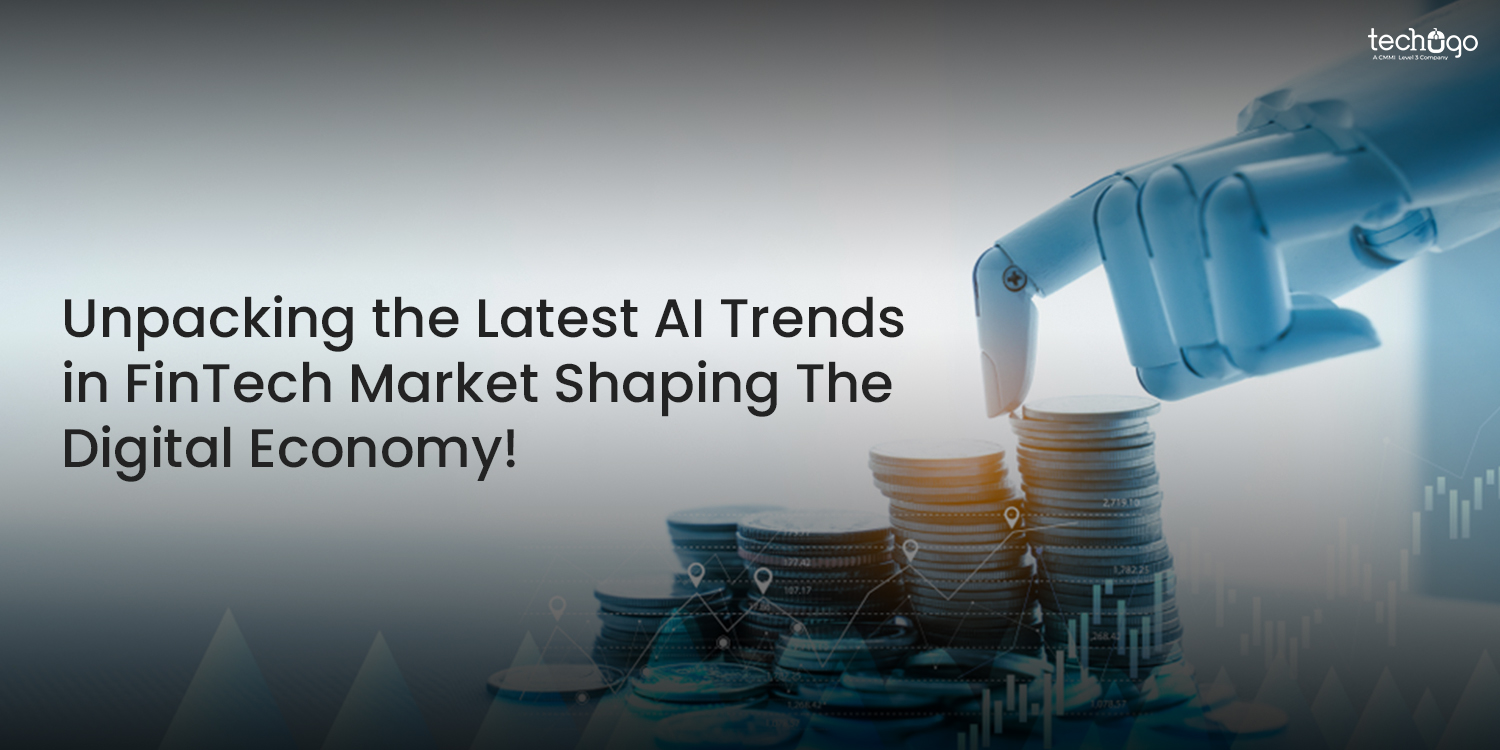27 Mar 2023
Unpacking the Latest AI Trends in FinTech Market Shaping The Digital Economy!
Ankit Singh

Machine learning was a relatively new concept in the early days of AI/ML. Only the most innovative and prominent companies used it. Today, AI/ML is used in almost half of the world’s business operations. Mckinsey’s ” State of AI” survey found that 56% of the companies surveyed had implemented AI. This is a wide range of industries, sizes, functional specialties, and tenures.
AI adoption in the financial sector is more advanced than ever, both for traditional financial service firms and newer FinTech businesses. A study by the World Economic Forum (the University of Cambridge Judge Business School) in 2019 found that 85% of respondents had used some form of AI.
How can we predict the future of AI in the FinTech market as AI and ML become more common? In the next few months, we expect 3 main trends to continue.
AI WILL MAKE INCREASINGLY IMPORTANT DECISIONS
AI in business was used first for algorithmic recommendation systems. These systems suggest products based on previous searches on Google or promote relevant accounts on social media platforms.
As artificial Intelligence improves and is better adapted to business processes, more complicated tasks are being outsourced to AI/ML capabilities. AI will be used in FinTech to assist with automated and mission-critical decisions. Apps for issuing credit, pricing insurance, and loans and detecting and blocking fraudulent transactions have become the norm.
Leading companies are using AI to reduce the human decision-making bottleneck. However, AI’s increased power and responsibility have many implications. These include ethical decision-making, regulatory matters, and the creation of essential public and private services.
AI WILL DEMOCRATIZE EXCEPTIONS TO FINANCIAL SERVICES
AI in FinTech Market will continue democratizing access to financial services in historically underserved markets over the following months and years.
Consider the hypothetical situation of a young adult with no credit score in the USA. Perhaps they have recently immigrated, or their parents have yet to help them build credit. As a result, they may have had to go through a long and difficult process to gain credit. This was often done via secured cards, eliminating risk for the lending institution.
Like the Brazilian Neobank giant Nubank, Nubank has become a leader in Latin America in using ML to determine how much credit they should give customers. As FinTech app development company around the globe adopt AI and ML, large and small, they are democratizing their services and improving their system operation.
HIGH-QUALITY AI MODELS WIN IN THE MARTIAL
The biggest challenge for most systems today is how to deploy machine learning models in production in a way that guarantees performance consistency.
Trust and performance go hand-in-hand. ML systems automate decision-making, which can include and reinforce biases and fall prey to data drift and broken data pipelines. As a result, ML systems can lose the trust of both customers and non-technical employees when they are not performing at their best.
Companies cannot compromise on quality control and testing when deploying models to production in order to maintain trust and maximize model outcomes. Problems in production can have severe consequences for customers and the company’s bottom lines.
Fintech and AI
AI promises a complete transformation of everything, but some things more than others. Already, the BFSI area has seen the incredible efficiency of AI in the FinTech Market processing massive data logs and providing insightful insights through pattern recognition. In addition, AI has significantly impacted the financial services industry, which is plagued by identity fraud and other imposter scams.
Also Read – 8 Trends in Fintech Mobile App 2023 that are Revolutionizing the Market !
AI enables faster and better fraud detection in a highly-digitized world where PII (Personally Identifiable Information) can be purchased for a few hundred dollars via the dark web. Furthermore, advanced fraud detection and risk monitoring allow for detection and prediction in real time, not after the fact.
The world of payment has advanced a lot, from barter to paper currency, plastic money to contactless cards to paper currency. AI promises to bring a new world of seamless and frictionless payments, where the outdated modern POS will seem archaic.
Read More – Cloud Pos VS Traditional Pos: Which is the Best Choice?
Conversational AI for fraud detection and many other uses
Fraudulent attempts can have a significant impact on operations. This is why it is high on the priority list of most financial institutions.
Natural Language Processing (NLP), a type of conversational AI, can be used across KYC or AML. NLP algorithms can be used to learn everything about customers – such as their spending habits, financial history, voice, behavioral biometrics, and unique risk factors – to reduce money laundering and other fraudulent activities.
However, it’s not just about fraud. NLP can be used to improve and transform customer experiences. Customer experience is significant.
The finTech industry uses AI
While we’ve discussed the trends of AI, let us now examine its typical applications within the FinTech industry.
1. Data analysis and learning
FinTech companies can use AI data mining tools to analyze data and identify data silos. AI and ML not only help businesses collect multiple facets of information but also assist in ingesting, cleaning, cleaning, and archiving the data by disclosing important information.
Businesses can also use manual data retrieval to get incomplete or superfluous data while offering some value.
The question now is: How is facial recognition achieved?
The process is quite simple. This computer vision-based technology recognizes the customer’s face and sends the template to an interpreter. The interpreter verifies that the template matches your bank’s original template.
The entire process takes only a few seconds. In addition, no intelligent devices or payment cards are required to complete this activity.
2. Trading
Businesses can use AI to analyze massive data sets in real time through algorithmic, quantitative, or high-frequency trading.
AI is used by capital management companies, mutual funds, and hedge funds to track equities with sharp up or down trends to enter or exit positions.
3. Bank income maximization through predictive modeling
Predictive modeling can be used to monitor the risks involved in loan underwriting and fraud detection. In addition, many institutions use predictive modeling to increase their cross-selling efficiency and take their sales to new heights.
The New Role of Fintech in Building A Digital Economy
We can now move on to the role of FinTech in the development of a digital economy, as you already know the cost to build a FinTech app.
Between 2019-20, India received nearly 3500 crore digital payments. The country has the potential to become a USD 1 trillion digital payments market. The government has been making consistent efforts to provide the needed push to India’s fintech sector – the fastest-growing technology-backed financial system in the world.
1. A Strategy Framework for Digital Evolution
The country is making great strides in becoming a leading fintech nation. It will take a strategic framework like the 4-stage approach used in recent years.
- Aadhaar was created to solve the problem of identity formalization.
- Pradhan Mantri Jan Dhan Yojana ensured every Indian citizen had a bank account to combat financial inequality.
- The movement of money was made more accessible by creating scalable platforms like UPI or IMPS.
- Lastly, fintech companies can be accessed, utilized, and innovate on platforms such as UPI alongside banks and other lending institutions, thus laying the foundation for AI in the digital economy.
2. Take One Step at a Time to Remove the Rural-Urban Divide
Urban areas quickly grasped the changes in the financial sector. Rural areas were more difficult to implement these behavioral changes. In 2016, demonetization brought fintech companies to prominence in the economy.
There have been many innovations in this area in recent years, including biometric payments (AEPS), UPI, and QR-based payments, as well as e-wallets offered by more than 50 banks.
3. We are paving the way for wide-scale inclusion
India, home to more than 500 million internet users today, is the second-largest digital market. However, digital penetration is currently at 26% despite this large population.
Cash is still essential, particularly in rural areas. However, card payments are the most significant driver of cashless payments. In addition, only 16% of rural users use the internet to make financial transactions, while 44% of urban users do the same.
The current rate of digital adoption in rural India is at least double the 35% mark. This growth is further accelerated by the rise of digital wallet platforms and online payment systems, ensuring wide-scale inclusion.
Redefining the Financial Service Landscape
India is fast on its way to becoming Asia’s most important financial hub. The country has an impressive 87% adoption rate compared to the 64% global average. Indian fintech companies are also paving the way for a new banking era, lowering costs, creating secure payment methods, developing innovative product services, and improving customer experiences. They have also popularized the concepts of e-wallets, paperless loans, secure payment gateways, and other related topics.
AI and the FinTech Industry: The Brighter Future
As we have continuously operated businesses using more advanced technology, financial institutions are now fighting against malign acts. In addition, the Fintech Industry uses this technology to improve daily operations and provide excellent protection.
The financial sector must remain competitive and current after witnessing the rise in malware activity. Artificial Intelligence will revolutionize how banks and credit unions offer security to protect their customers’ assets and data.
Parallel to the advancement of technology, we will explain why. As technology advances, so do the malign acts. The FinTech industry’s goal is not to expand and embrace AI to improve customer experience but rather to ensure that businesses are secure.
AI has taken on the responsibility of the world, particularly the FinTech industry, to scale up businesses using advanced technology. We hope you now understand why billionaires worldwide have spoken out in amazement about artificial intelligence.
Also Read – Fintech Special: How to Get Your Investor’s Attention?
Conclusion
Financial technology and fintech startups have grown in many areas, including WealthTech, lending, and digital payments. In addition, Fintech is laying the foundation for a digital economy in today’s age through large volumes of online transactions.
The country will continue to be a leader in fintech ecosystems worldwide. It is therefore safe to say that India’s future looks bright. The government is experiencing a paradigm change, with fintech companies working tirelessly to reshape and reinvent it. Connect with Techugo, the top mobile app development company, to explore more about AI and FinTech.
Get in touch.
Write Us
sales@techugo.comOr fill this form



